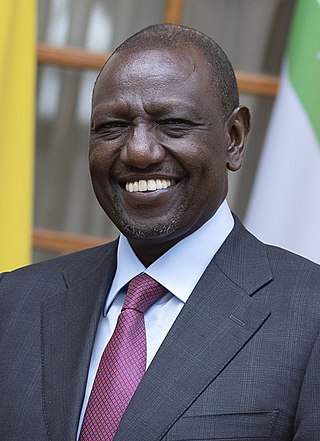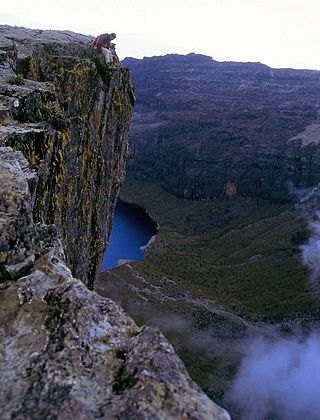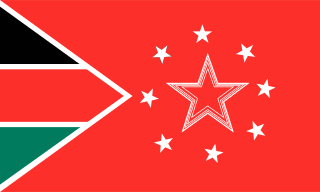 |
|---|
The Kenya Law Reform Commission is a government Commission established to keep under review all the law of Kenya in order to ensure its systematic development and reform. [1]
 |
|---|
The Kenya Law Reform Commission is a government Commission established to keep under review all the law of Kenya in order to ensure its systematic development and reform. [1]
The commission's roles include: [2]
The current membership of the Commission is as follows: [3]
Separation of powers is the division of a state's government into branches, each with separate, independent powers and responsibilities, so that the powers of one branch are not in conflict with others. The typical division into three branches of government, sometimes called the trias politica model, includes a legislature, an executive, and a judiciary. It can be contrasted with the fusion of powers in monarchies, but also parliamentary and semi-presidential systems where there can be overlap in membership and functions between different branches, especially the executive and legislative.

The president of the Republic of Kenya is the head of state and head of government of the Republic of Kenya. The president is also the head of the executive branch of the Government of Kenya and is the commander-in-chief of the Kenya Defence Forces. The country's current president is William Ruto since 13 September 2022.

A government agency or 1 Branches, state agency, sometimes an appointed commission, is a permanent or semi-permanent organization in the machinery of government (bureaucracy) that is responsible for the oversight and administration of specific functions, such as an administration. There is a notable variety of agency types. Although usage differs, a government agency is normally distinct both from a department or ministry, and other types of public body established by government. The functions of an agency are normally executive in character since different types of organizations are most often constituted in an advisory role — this distinction is often blurred in practice however, it is not allowed.

The Government of Singapore is defined by the Constitution of the Republic of Singapore to consist of the President and the Executive. Executive authority of Singapore is vested in the President but exercised on the advice of the Cabinet led by the Prime Minister. The President, acting as the Head of State, may only act in their discretion in appointing the Prime Minister, acting as the Head of Government; as well as withholding consent for the dissolution of Parliament; along with performing key checks on the Government in addition to the ceremonial duties of the Head of State inherited from the Westminster system. The Cabinet, consisting of the Prime Minister and ministers appointed by the President on the Prime Minister's advice, is responsible for heading the Executive through ministries and other statutory boards. At the end of the term or at any time during the term, once the President has consented to a request made by the Prime Minister to dissolve Parliament, Parliamentary General Elections are held to elect members of Parliament for a new term. The President, in their discretion, then appoints a Prime Minister who is a member of Parliament representing any political party or coalition of political parties who in their judgement is likely to command the confidence of the majority of the members of Parliament. The Prime Minister then forms the Government and, along with the Cabinet, sets the general direction and control of the Government for the next term.

Meru County is one of the 47 counties of Kenya. It borders Isiolo County to the north, Tharaka-Nithi County to the South, Nyeri County to the southwest and Laikipia County to the west. The home of the Meru people, Meru County has a population of 1.35 million people.

The deputy president of the Republic of Kenya is the principal assistant of the President of the Republic of Kenya.
The Australian Law Reform Commission is an Australian independent statutory body established to conduct reviews into the law of Australia. The reviews, also called inquiries or references, are referred to the ALRC by the Attorney-General for Australia. Based on its research and consultations throughout an inquiry, the ALRC makes recommendations to government so that government can make informed decisions about law reform.
The civil service in Malaysia is pivotal around Article 132 of the Constitution of Malaysia which stipulates that the public services shall consist of the Federal and State General Public Service, the Joint Public Services, the Education Service, the Judiciary and the Legal Service and the Armed Forces.

Mandera County is one of the counties in Kenya. Its capital and largest town is Mandera. The county is bordered by Ethiopia to the north, Somalia to the east and Wajir County to the southwest. According to the 2019 census, the county has a population of 1,200,890 and an area of 25,939.8 square kilometres (10,015.4 sq mi). The main economic activity in the county is pastoralism, while others include cross-border trade with Ethiopia, artisanal mining, beekeeping, and agriculture along the Dawa River.
The local government in Malaysia is the lowest tier of government in Malaysia administered under the states and federal territories which in turn are beneath the federal tier. Local governments are generally under the exclusive purview of the state governments as provided in the Constitution of Malaysia, except for local governments in the federal territories. The federal Ministry of Local Government Development plays a role in co-ordinating and standardising the practices of local governments across the country.

The Government of the Republic of Kenya (GoK) is the national government of the Republic of Kenya, a federal republic located in East Africa, composed of 47 Counties, each county with its own semi-autonomous governments, including the national capital of Nairobi, where the national government is primarily based.

The Ministry of Finance, Planning and Economic Development (MoFPED) is a cabinet-level government ministry of Uganda. Its mandate is to formulate sound economic and fiscal policies, mobilize resources for the implementation of government programmes, disburse public resources as appropriated by Parliament, and account for their use in accordance with national laws and international best practices. The cabinet minister of finance is Matia Kasaija. MoFPED was created by the 1995 Constitution of Uganda and derives its power from the Constitution and related acts of parliament, including the 2001 Budget Act and the 2003 Public Finance and Accountability Act. The current Director of Economic Affairs in the Ministry of Finance, Planning and Economic Development of Uganda is Lawrence Kiiza.

An ombudsman, ombud, ombuds, bud, ombudswoman, ombudsperson, or public advocate is a government employee who investigates and tries to resolve complaints, usually through recommendations or mediation. They are usually appointed by the government or by parliament.

The Constitution of Kenya is the supreme law of the Republic of Kenya. There have been three significant versions of the constitution, with the most recent redraft being enabled in 2010. The constitution was presented to the Attorney General of Kenya on 7 April 2010, officially published on 6 May 2010, and was subjected to a referendum on 4 August 2010. The new Constitution was approved by 67% of Kenyan voters. The constitution was promulgated on 27 August 2010.

The Constitution of Kingdom of Bhutan was enacted 18 July 2008 by the Royal Government of Bhutan. The Constitution was thoroughly planned by several government officers and agencies over a period of almost seven years amid increasing democratic reforms in Bhutan. The current Constitution is based on Buddhist philosophy, international Conventions on Human Rights, comparative analysis of 20 other modern constitutions, public opinion, and existing laws, authorities, and precedents. According to Princess Sonam Wangchuck, the constitutional committee was particularly influenced by the Constitution of South Africa because of its strong protection of human rights.
The Office of the Australian Information Commissioner (OAIC), known until 2010 as the Office of the Australian Privacy Commissioner is an independent Australian Government agency, acting as the national data protection authority for Australia, established under the Australian Information Commissioner Act 2010, headed by the Australian Information Commissioner.

The National Land Commission of Kenya is an independent government commission whose establishment was provided for by the Constitution of Kenya to, amongst other things, manage public land on behalf of the national and county governments, initiate investigations into present or historical land injustices and recommend appropriate redress, and monitor and have oversight responsibilities over land use planning throughout the country. NLC was officially established under The National Land Commission Act of 2012.
The Ministry of Justice of the Republic of Uzbekistan,, is the central government body charged consistent implementation of a single state policy in the sphere of lawmaking and law enforcement practice in Uzbekistan.
Access to public information and freedom of information (FOI) refer to the right of access to information held by public bodies also known as "right to know". Access to public information is considered of fundamental importance for the effective functioning of democratic systems, as it enhances governments' and public officials' accountability, boosting people participation and allowing their informed participation into public life. The fundamental premise of the right of access to public information is that the information held by governmental institutions is in principle public and may be concealed only on the basis of legitimate reasons which should be detailed in the law.
The Ministry of Transport, later known as the Department of Transport, was a statutory ministry that acted as the chief transport agency of the Government of Victoria between 1958 and 1996. Originally established by the Transport Act 1951 and strengthened by the Transport Act 1983, the Ministry took on a variety of roles, coordinating the state's other transport operations and reporting to a number of Ministers throughout its history.